
There’s been a sweeping change in shopper behavior in Prince George’s County since the beginning of the year, as shoppers have switched from single-use plastic carryout bags to reusable bags or no bag!
The Prince George’s County Council passed the Better Bag Bill (CB-32-2023) in June 2023 to reduce litter and plastic pollution from carryout bags, reduce single-use waste, and incentivize shoppers to use reusable carryout bags or not to take a bag at all. The bill prohibits retailers from providing plastic carryout bags that are not reusable, defines reusable carryout bags, and requires retailers to charge and retain at least 10 cents for paper and other carryout bags. The purpose of the minimum charge for other carryout bags is to encourage shoppers to bring their own bag or not take one. Retailers retain the revenue from the sale of alternative carryout bags to cover their cost. College Park, Greenbelt, and Laurel launched similar municipal ordinances at about the same time as the County.
Before the County’s Better Bag Bill went into effect in January 2024, 88% of shoppers at major grocery chains were using single-use plastic carryout bags; only 12% were using reusable bags or not taking a bag at all. Over four weekends in May 2024, Sierra Club volunteers observed the types of bags used by over 9,000 shoppers exiting 70 grocery stores across the County to measure the impact of the Better Bag Bill on shopper behavior. They resurveyed the same store chains surveyed in 2019, before the bill went into effect, including stores from the seven major grocery chains (Food Lion, Giant, Harris Teeter, Safeway, Shoppers, Wegmans, Weis Market), three international grocery chains (Bestway, LaGrande, Megamart), and two grocery chains that already had a policy in place not to offer single-use plastic carryout bags and to charge for all alternative carryout bags (Aldi, Lidl).
The results of the resurvey are in!
- Five months after the bill went into effect, at the major grocery chains the share of shoppers using reusable bags or not taking a bag has risen from 12% to 69%! This includes 43% of shoppers who opted not to use a carryout bag at all and 26% who used a reusable bag (Figure 1). Thirty percent of shoppers were using a paper bag.
Figure 1: Distribution of Prince George’s grocery shoppers at seven major chains according to their carryout bag use, before and after the Better Bag Bill (%)
|
Fall 2019 |
May 2024 |
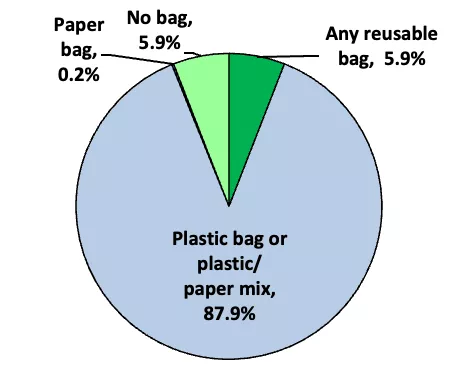
|
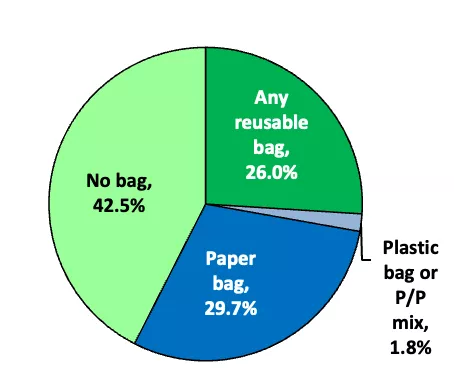
|
Source: Prince George’s Sierra Club Shopper Surveys, 2019 and 2024. Results are for all stores in the following grocery chains: Food Lion, Giant, Harris Teeter, Safeway, Shoppers, Wegmans, Weis Markets.
- These dramatic increases in the share of shoppers using reusable bags or no bag were observed in every County Council District (Figure 2).
Figure 2. Percent of shoppers using a reusable bag or no bag, 2019 and 2024, by council district
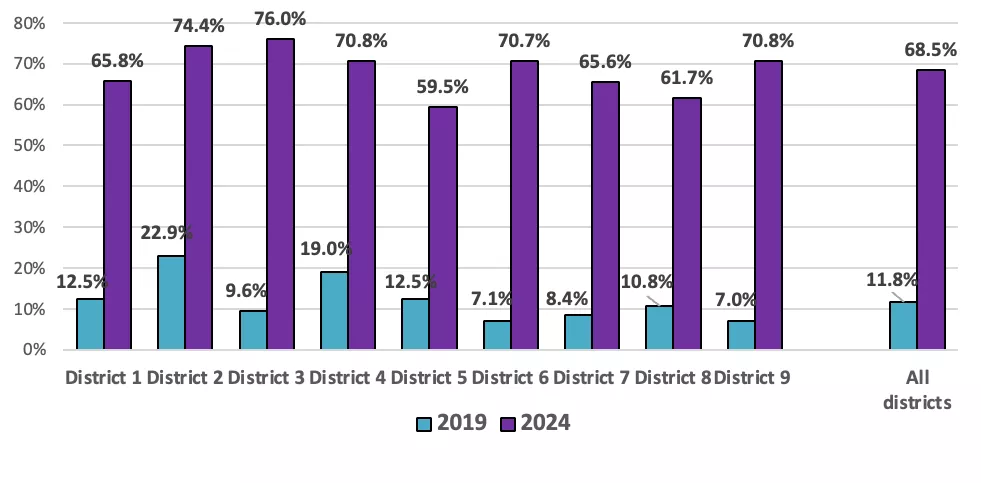
- The response of shoppers at the three international chains was even greater, while shoppers at Aldi and Lidl continued their high resort to reusable bags or no bag (Figure 3). Some of the international stores declined to offer paper bags, and only sold reusables.
Figure 3. Percent of shoppers using a reusable bag or no bag, 2019 and 2024, by grocery store category
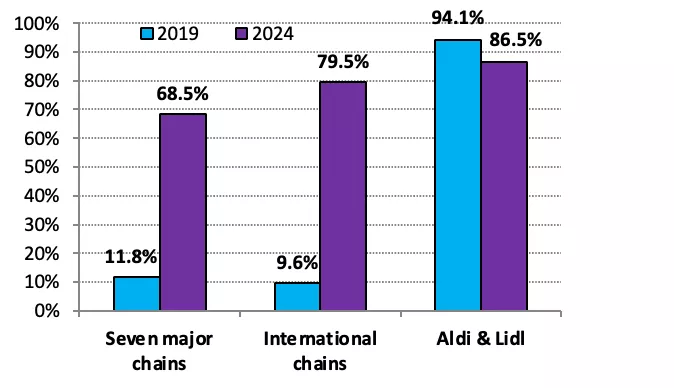
- Adding a minimum charge for paper and reusable bags to the City of Laurel’s existing plastic carryout bag ban incentivized shoppers to shift from single-use paper bags to reusables or no bag (Figure 4).
- When Laurel grocery stores were surveyed in 2019, before any carryout bag policy was in effect, 87% of shoppers at the main grocery chains were taking plastic bags; only 12% were using reusable bags or no bag.
- The City banned single-use plastic carryout bags as of January 2022. Most stores then provided complimentary paper bags at checkout. A whopping 68% of shoppers took paper bags, which have a major environmental and environmental justice footprint. The share of shoppers using reusable bags or no bag rose to only 31%.
- In January 2024, the City added to the plastic bag ban a mandatory minimum charge of 10 cents for paper and reusable bags, which reduced paper bag use by more than half (to 32%) and raised the share of shoppers using reusable bags or no bag to 66%.
Figure 4. Adding a minimum charge for paper and reusable bags in Laurel Incentivized a switch to reusable bags or no bag
(Percent of shoppers using a reusable bag or no bag)
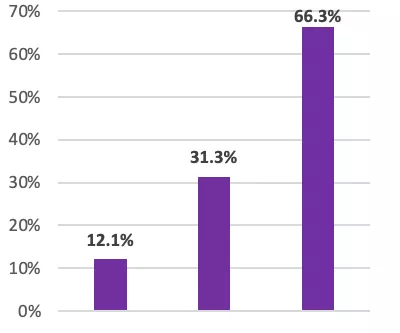
2019 2022 2024
Methodological note
These findings are based on the Prince George’s Sierra Club’s observational surveys of shoppers’ carryout bag use as they exited grocery stores across the County in the fall of 2019 and in May 2024.[1] Trained volunteers observed the bag choices of shoppers for an hour at each grocery store’s exit on a weekend day. They tallied for each exit whether shoppers had single-use plastic carryout bags, reusable carryout bags, paper carryout bags, only unbagged merchandise, or a combination of these categories. The definition of the four main categories shown in the pie and bar charts are as follows:
Any reusable bag: Shopper has only reusable carryout bags, reusable carryout bags and other single-use paper or plastic carryout bags, or reusable bags and unbagged merchandise
Plastic bag or paper/plastic mix: Shopper has only plastic carryout bags, plastic carryout bags and other unbagged merchandise, or both plastic and paper carryout bags with or without unbagged merchandise.
Paper bag: Shopper has only paper carryout bags or paper carryout bags and unbagged merchandise
No bag: Shopper has no carryout bags, only unbagged merchandise.
The level of observation was an adult shopper with a carryout bag or merchandise; bags carried by children were attributed to the adult they were with. A shopping cart pushed by one or more people was counted as a single observation.
Stores of the following chains were surveyed:
|
Category |
Chains |
2019 |
2024 |
||
|
Stores |
Shoppers |
Stores |
Shoppers |
||
|
Main grocery chains that offered single-use plastic carryout bags before the Better Bag Bill |
Food Lion, Giant, Harris Teeter, Safeway, Shoppers, Wegmans, Weis Markets |
48 |
7,694 |
42 |
6,138 |
|
International grocers that offered single-use plastic carryout bags before the Better Bag Bill |
Bestway, La Grande, Megamart
|
6 |
742 |
6 |
632 |
|
Grocers that didn’t offer single-use plastic carryout bags before the ban and charged for other bags |
Aldi, Lidl |
13 |
1,550 |
20 |
1,904 |
|
Other stores in Greenbelt that previously offered single-use plastic carryout bags |
Greenbelt Co-op, Target |
2 |
357 |
2 |
364 |
|
TOTAL: |
|
69 |
10,343 |
70 |
9,038 |
For more information, contact martha.ainsworth@mdsierra.org.
[1]Prior to 2019, Sierra Club volunteers conducted surveys of shoppers’ bag use in Prince George’s County in 2012 and 2014. Similar surveys have now been conducted in 15 counties and the City of Baltimore, in some cases, more than once.